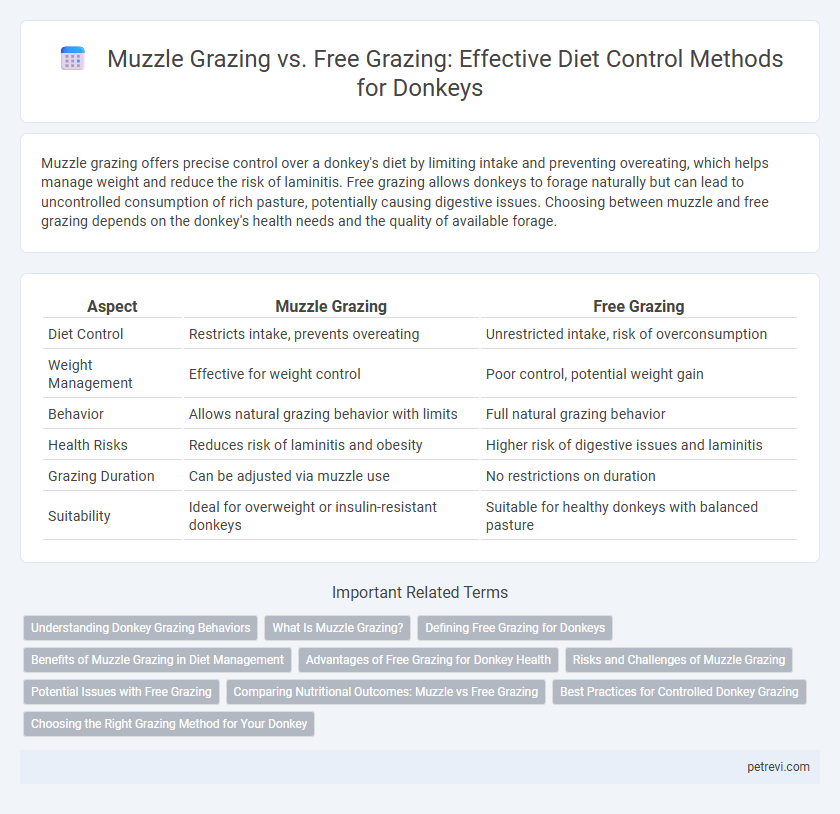Muzzle grazing offers precise control over a donkey's diet by limiting intake and preventing overeating, which helps manage weight and reduce the risk of laminitis. Free grazing allows donkeys to forage naturally but can lead to uncontrolled consumption of rich pasture, potentially causing digestive issues. Choosing between muzzle and free grazing depends on the donkey's health needs and the quality of available forage.
Table of Comparison
| Aspect | Muzzle Grazing | Free Grazing |
|---|---|---|
| Diet Control | Restricts intake, prevents overeating | Unrestricted intake, risk of overconsumption |
| Weight Management | Effective for weight control | Poor control, potential weight gain |
| Behavior | Allows natural grazing behavior with limits | Full natural grazing behavior |
| Health Risks | Reduces risk of laminitis and obesity | Higher risk of digestive issues and laminitis |
| Grazing Duration | Can be adjusted via muzzle use | No restrictions on duration |
| Suitability | Ideal for overweight or insulin-resistant donkeys | Suitable for healthy donkeys with balanced pasture |
Understanding Donkey Grazing Behaviors
Donkeys exhibit selective grazing behaviors, often preferring specific plants and grazing patterns that influence their dietary intake. Muzzle grazing controls food consumption by restricting intake, preventing overgrazing and obesity, while free grazing allows natural foraging but risks dietary imbalances and overconsumption. Understanding these behaviors is essential for optimizing donkey health through controlled nutrition and pasture management strategies.
What Is Muzzle Grazing?
Muzzle grazing for donkeys involves fitting a specialized grazing muzzle that restricts the animal's intake by limiting how much grass it can bite, helping control calorie consumption and prevent obesity. This method allows donkeys to graze naturally while reducing the risk of overeating rich pasture, which can lead to laminitis and other health issues. Muzzle grazing is a practical approach for managing diet in donkeys with metabolic sensitivities, balancing their need for foraging with nutritional control.
Defining Free Grazing for Donkeys
Free grazing for donkeys involves allowing animals unrestricted access to pasture, enabling natural foraging behavior and selective feeding on various grasses and shrubs. This method supports dietary variety and can help maintain digestive health by providing fiber-rich forage. Monitoring pasture quality and preventing overgrazing are critical to ensuring the nutritional balance of free-grazed donkeys.
Benefits of Muzzle Grazing in Diet Management
Muzzle grazing effectively limits a donkey's intake by allowing controlled access to pasture, preventing overeating and reducing the risk of obesity and laminitis. This method supports precise diet management by restricting forage consumption while still permitting natural grazing behavior. Muzzle grazing also helps maintain digestive health by promoting slower, regulated feeding patterns compared to free grazing.
Advantages of Free Grazing for Donkey Health
Free grazing allows donkeys to select a diverse range of plants, promoting a balanced intake of essential nutrients and reducing the risk of dietary deficiencies. Access to natural forage supports improved digestion and mental well-being by enabling natural foraging behaviors. Exposure to varied vegetation also helps maintain dental health by encouraging natural chewing patterns and preventing overgrowth.
Risks and Challenges of Muzzle Grazing
Muzzle grazing in donkeys restricts forage intake to prevent obesity but poses risks such as increased stress, potential for obstructed breathing, and digestive upset due to altered feeding patterns. Donkeys wearing muzzles may experience frustration and reduced opportunities for natural grazing behaviors, which can lead to behavioral issues and decreased well-being. Effective diet control through muzzle grazing requires careful monitoring to balance weight management with the donkeys' physiological and psychological needs.
Potential Issues with Free Grazing
Free grazing in donkeys often leads to uncontrolled calorie intake, increasing risks of obesity and laminitis due to overconsumption of rich pasture. Unrestricted access to pasture can result in uneven nutrient absorption and digestive imbalances, contributing to colic and other gastrointestinal problems. Behavioral issues such as frustration and aggression may emerge when donkeys are unable to regulate their feeding naturally in free grazing environments.
Comparing Nutritional Outcomes: Muzzle vs Free Grazing
Muzzle grazing limits forage intake, which helps control calorie consumption and reduces the risk of obesity and laminitis in donkeys. Free grazing allows unrestricted access to natural grasses, leading to higher fiber intake and potentially increased nutrient diversity but may result in excessive calorie intake. Studies show muzzle grazing supports better weight management and stable blood glucose levels while free grazing improves overall micronutrient variety but increases the need for monitoring dietary balance.
Best Practices for Controlled Donkey Grazing
Using a muzzle for grazing helps control a donkey's intake by limiting access to grass, preventing overeating and obesity, which are common issues with free grazing. Best practices for controlled donkey grazing involve combining timed muzzle grazing sessions with access to low-calorie forage to maintain a balanced diet and promote healthy weight. Regular monitoring of body condition score alongside rotational grazing areas reduces the risk of laminitis and digestive problems, ensuring optimal donkey health.
Choosing the Right Grazing Method for Your Donkey
Muzzle grazing offers precise diet control by limiting pasture intake, reducing the risk of obesity and laminitis in donkeys prone to overfeeding, while free grazing allows natural foraging behavior but may lead to excessive calorie consumption if not monitored. Selecting the right grazing method depends on your donkey's health status, weight management needs, and pasture quality, with muzzles being ideal for donkeys requiring restricted grazing. Regular assessment of body condition score and veterinary consultation help optimize grazing strategies to maintain optimal donkey health and nutrition.
Muzzle Grazing vs Free Grazing for Donkey Diet Control Infographic

 petrevi.com
petrevi.com